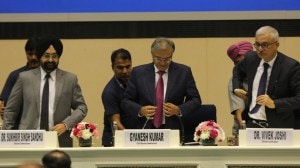Chardham project: Follow 2018 circular by highway ministry, says SC
According to the 2018 guidelines, “intermediate carriageway of 5.5 m tarred surface be adopted” for roads in such terrain.
 On September 10, the top court had asked the High Courts to give details through e-mails by September 12 about the other pending criminal cases against politicians under special laws.
On September 10, the top court had asked the High Courts to give details through e-mails by September 12 about the other pending criminal cases against politicians under special laws.The Supreme Court on Tuesday asked the Ministry of Road Transport and Highways (MoRTH) to go by its 2018 circular on the width of roads in hilly terrain in the execution of the Chardham road project. According to the 2018 guidelines, “intermediate carriageway of 5.5 m tarred surface be adopted” for roads in such terrain.
The Chardham project, meant to widen 889 km of hill roads to provide all-weather connectivity between the major pilgrimage sites in Uttarakhand, had run into a heated debate with members of a Supreme Court-appointed High Powered Committee divided on the width of the road.
While the majority favoured increasing the width to 12 metres, the minority, including the committee chairman, backed 5.5 metres for the carriageway and additional paved shoulder — taking the total width to about 7 to 7.5 metres — for use by pedestrians/pilgrims who take the trek to the holy sites by foot.
Hearing the matter on Tuesday, a bench headed by Justice R F Nariman told Solicitor General Tushar Mehta “all you have to do is to go by your (MoRTH) 2018 guidelines”. The Solicitor General pointed out that the “minority view” of the High Powered Committee had favoured the 2018 circular fixing width as 5.5 metre for intermediate carriageway. On the recommendation for increasing the width, he said this was because the project area falls near the India-China border, more width is needed for movement of military vehicles.
Senior Advocate Sanjay Parikh, appearing for the petitioner NGO, however, said that 7-7.5 metres was enough for military officials.
He also referred to the HPC report pointing to authorities allegedly flouting environmental norms in the construction.
The committee was constituted by the Supreme Court to look into the ecological impact of the ‘Chardham Pariyojana’.
In August last year, the apex court cleared the decks for the Chardham highway project by modifying a National Green Tribunal order to constitute a High-Powered Committee to look into environmental concerns.







